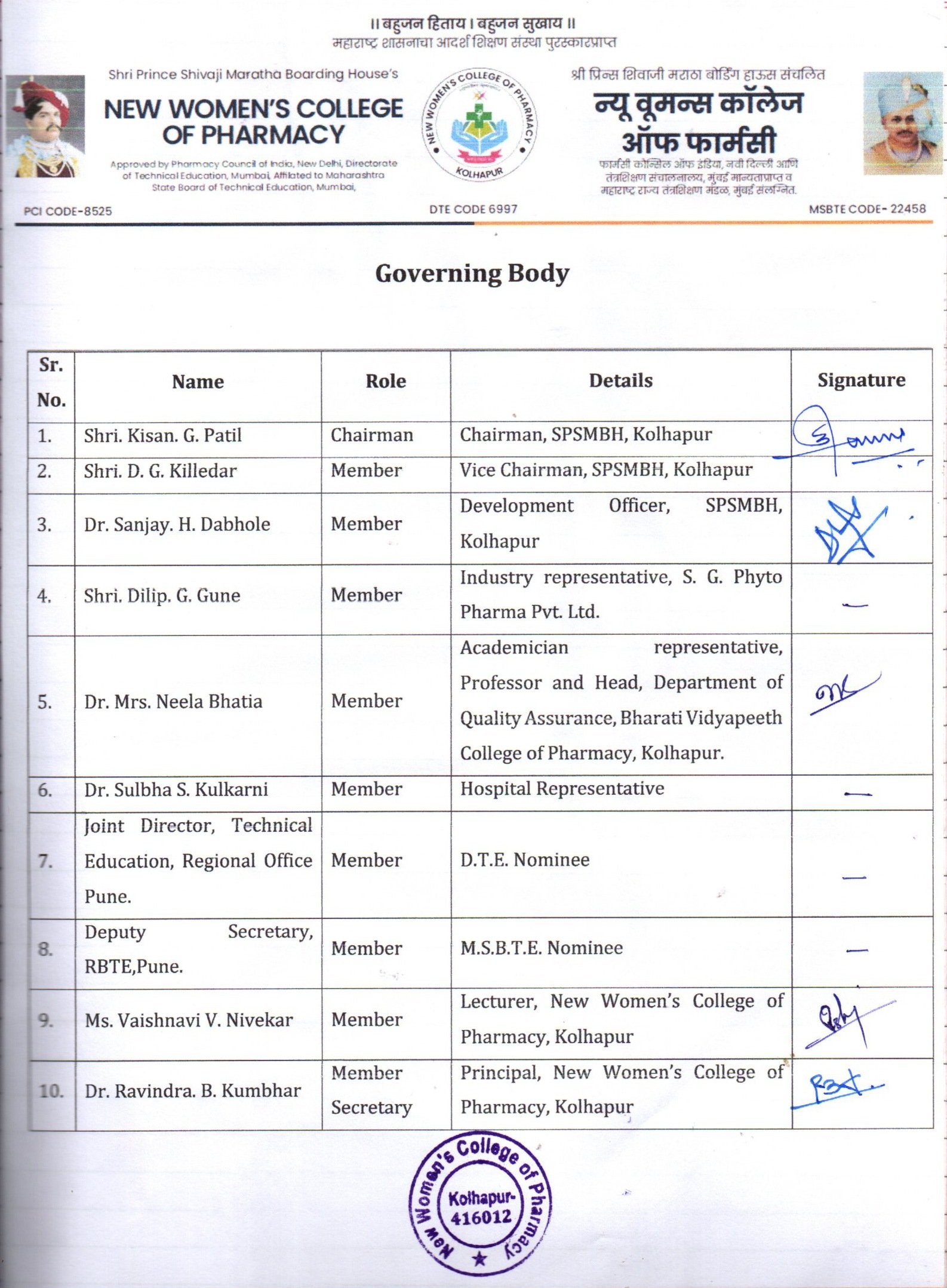Constitution for Governing Body

|
Sr. No. |
Name |
Role |
Details |
|
1. |
Shri. Kisan. G. Patil |
Chairman |
Chairman, SPSMBH, Kolhapur |
|
2. |
Shri. D. G. Killedar |
Member |
Vice Chairman, SPSMBH, Kolhapur |
|
3. |
Dr. Sanjay. H. Dabhole |
Member |
Development Officer, SPSMBH, Kolhapur |
|
4. |
Shri. Dilip. G. Gune |
Member |
Industry representative, S. G. Phyto Pharma Pvt. Ltd. |
|
5. |
Dr. Mrs. Neela Bhatia |
Member |
Academician representative, Professor and Head, Department of Quality Assurance, Bharati Vidyapeeth College of Pharmacy, Kolhapur. |
|
6. |
Dr. Sulbha S. Kulkarni |
Member |
Hospital Representative |
|
7. |
Joint Director, Technical Education, Regional Office Pune. |
Member |
D.T.E. Nominee |
|
8. |
Deputy Secretary, RBTE,Pune. |
Member |
M.S.B.T.E. Nominee |
|
9. |
Ms. Vaishnavi V. Nivekar |
Member |
Lecturer, New Women’s College of Pharmacy, Kolhapur |
|
10. |
Dr. Ravindra. B. Kumbhar |
Member Secretary |
Principal, New Women’s College of Pharmacy, Kolhapur |
The Governing Body of the “New Women’s College of Pharmacy” serves as the highest decision-making authority responsible for setting the college’s strategic direction, policies, and overseeing its overall functioning. Here are its functions, goals, roles, and duties:
-
Function:
a. Strategic Planning:
- Develop and implement long-term strategic plans and goals for the college’s growth, development, and academic excellence.
- Define the college’s mission, vision, and values, ensuring alignment with its educational objectives and societal needs.
b. Policy Formulation:
- Formulate and review policies, rules, and regulations governing various aspects of college administration, academics, finance, infrastructure, and student affairs.
- Ensure that policies are in compliance with statutory requirements, accreditation standards, and best practices in higher education.
c. Resource Allocation:
- Allocate financial resources, human resources, and infrastructure to support the college’s academic programs, research activities, and student services.
- Monitor budgetary allocations and expenditures to ensure financial sustainability and accountability.
d. Quality Assurance:
- Establish mechanisms for quality assurance and enhancement, including accreditation processes, academic audits, and performance evaluations.
- Monitor and evaluate the effectiveness of teaching, learning, and research activities to maintain high academic standards and educational outcomes.
e. Community Engagement:
- Foster relationships with stakeholders, including students, faculty, staff, alumni, industry partners, and regulatory bodies, to promote collaboration, transparency, and accountability.
- Engage with the local community and society at large to address societal needs, promote social responsibility, and contribute to community development.
-
Goals:
a. Academic Excellence:
- Ensure that the college maintains high academic standards and provides quality education and training in pharmaceutical sciences.
- Foster an environment conducive to teaching, learning, and research excellence, supporting faculty development and student success.
b. Governance Effectiveness:
- Enhance the effectiveness, transparency, and accountability of college governance processes and decision-making mechanisms.
- Uphold ethical principles, integrity, and professionalism in all aspects of college governance and administration.
c. Sustainable Growth:
- Promote sustainable growth and development of the college, balancing the needs of stakeholders with long-term sustainability goals.
- Identify opportunities for expansion, innovation, and diversification to meet the evolving needs of the pharmaceutical industry and society.
d. Student-Centric Approach:
- Prioritize students’ welfare, interests, and academic success in all governance decisions and policies.
- Create a supportive, inclusive, and conducive learning environment that fosters students’ personal, intellectual, and professional growth.
-
Role:
a. Policy Oversight:
- Review and approve policies, regulations, and guidelines proposed by various committees and departments, ensuring consistency with the college’s mission and goals.
b. Strategic Planning:
- Develop and review the college’s strategic plan, setting priorities, goals, and performance indicators to guide its development and growth.
c. Financial Oversight:
- Oversee the college’s finances, including budgeting, financial reporting, auditing, and compliance with financial regulations and accountability standards.
d. Appointment and Evaluation:
- Appoint, evaluate, and provide oversight to key administrative and academic leaders, including the Principal, Deans, and department heads.
e. Risk Management:
- Identify, assess, and mitigate risks and challenges that may affect the college’s operations, reputation, or financial sustainability.
- Establish contingency plans and crisis management protocols to address emergencies or unforeseen events.
-
Duties:
a. Meetings and Decision-Making:
- Convene regular meetings of the Governing Body to discuss and make decisions on key strategic, financial, and policy matters.
- Ensure that decisions are made in a transparent, collaborative, and informed manner, with due consideration for the interests of all stakeholders.
b. Compliance and Accountability:
- Ensure compliance with statutory requirements, regulatory guidelines, and accreditation standards applicable to the college.
- Hold administrators, faculty, and staff accountable for fulfilling their responsibilities and achieving performance targets.
c. Communication and Engagement:
- Communicate effectively with stakeholders, providing timely updates, information, and opportunities for feedback and engagement.
- Foster a culture of transparency, open communication, and trust among all members of the college community.
d. Continuous Improvement:
- Continuously evaluate and improve the effectiveness of governance processes, structures, and practices based on feedback, evaluation, and benchmarking.
- Promote a culture of continuous learning, innovation, and excellence within the college’s governance framework.
By fulfilling these functions, goals, roles, and duties, the Governing Body of the “New Women’s College of Pharmacy” can effectively guide the college towards achieving its mission, vision, and goals, while ensuring accountability, transparency, and excellence in governance.

